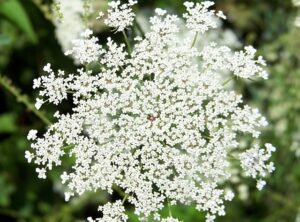
Queen Anne’s Lace (Daucus carota) 🌸🌿
Queen Anne’s Lace, also known as Wild Carrot, is a medicinal herb with a history of use for its diuretic, digestive, and anti-inflammatory properties. It contains essential oils, flavonoids, and carotenoids, which give it a variety of medicinal uses.
- Diuretic Properties:
- Promotes urination, aiding in the removal of excess water, toxins, and waste from the body.
- Supports kidney and bladder health, including relief for mild urinary tract infections.
- Digestive Health:
- Improves digestion and alleviates mild gastrointestinal issues such as bloating and indigestion.
- May help expel intestinal worms or parasites when used traditionally.
- Menstrual Support:
- Traditionally used to regulate menstrual cycles and ease menstrual cramps.
- Acts as a mild emmenagogue, stimulating delayed menstruation (use with caution).
- Anti-Inflammatory Effects:
- Reduces inflammation, making it useful for arthritis and other inflammatory conditions.
- Wound Healing:
- The seeds and flowers have been used in poultices for minor cuts, wounds, and skin irritations.
- Respiratory Health:
- Helps to soothe coughs and respiratory irritation.
- Traditionally used for mild bronchial or throat conditions.
- Kidney Stone Prevention:
- Assists in preventing the formation of kidney stones by flushing the urinary system.
- Blood Sugar Regulation:
- May help in managing blood sugar levels when used regularly, though further research is needed.
- Detoxification:
- Supports liver health and aids in the detoxification process.
Who Should Avoid Queen Anne’s Lace?
⚠️ Pregnant or Breastfeeding Women – Queen Anne’s Lace is not recommended during pregnancy as it can act as a uterine stimulant, which could lead to miscarriage. It’s also best to avoid it during breastfeeding, as there is not enough information on its safety.
⚠️ People with Allergies to Carrot Family Plants – Since Queen Anne’s Lace is a member of the Apiaceae (carrot) family, those with allergies to carrots, celery, or parsley should avoid it.
⚠️ People with Kidney Problems – Although it can benefit healthy kidneys, excessive use of Queen Anne’s Lace, especially its seeds, may have a strong diuretic effect, which could be risky for individuals with kidney disease or kidney dysfunction.
⚠️ Individuals Taking Diuretics or Blood Pressure Medication – If you are on diuretics or medications for blood pressure, Queen Anne’s Lace may interact with these drugs, so it’s important to consult with a healthcare provider first.








Reviews
There are no reviews yet.